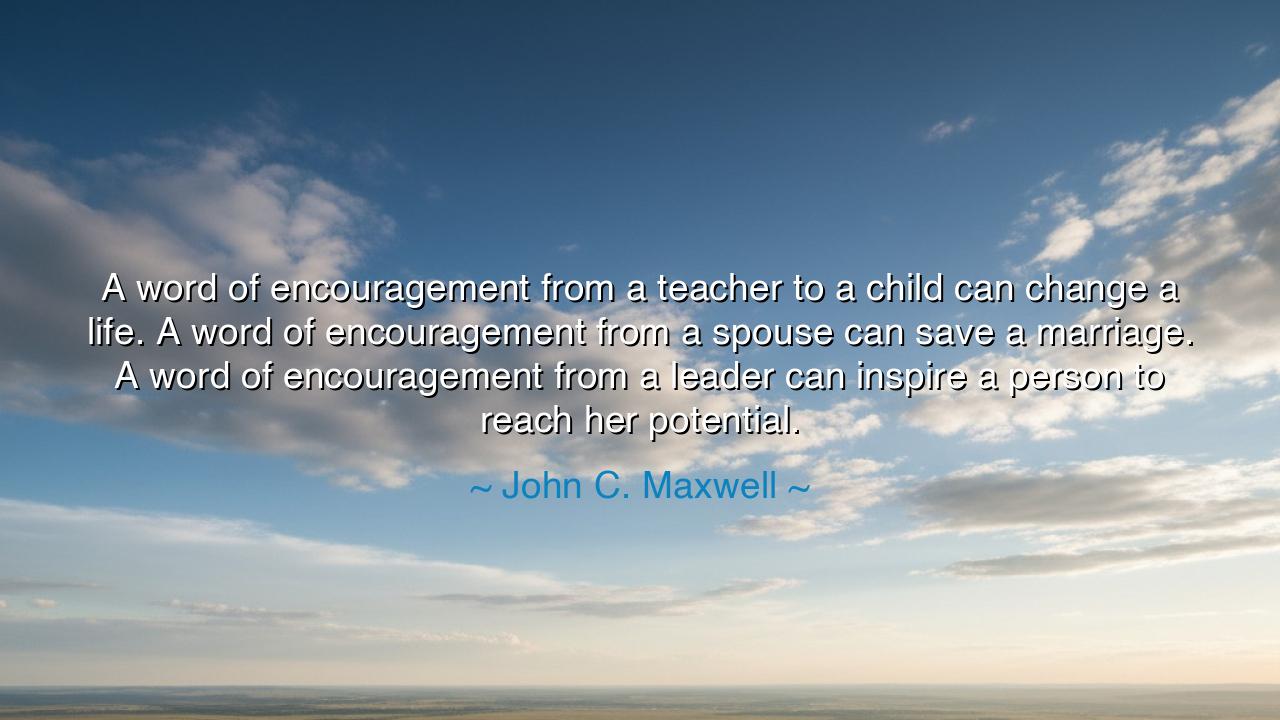
A word of encouragement from a teacher to a child can change a
A word of encouragement from a teacher to a child can change a life. A word of encouragement from a spouse can save a marriage. A word of encouragement from a leader can inspire a person to reach her potential.






John C. Maxwell’s words shine with the quiet power of truth: “A word of encouragement from a teacher to a child can change a life. A word of encouragement from a spouse can save a marriage. A word of encouragement from a leader can inspire a person to reach her potential.” In this saying, he reminds us that greatness does not always come from grand actions, but often from the smallest of gifts: a word spoken at the right moment, a seed planted in the soil of the heart. The ancients knew this too, for they taught that words are not mere sounds but living forces, shaping destinies and breathing life or death into the spirit.
The first image he gives us is the teacher and the child. A single phrase of belief spoken into a young soul can ignite a flame that burns for decades. The child who is told, “You can,” carries that word like armor against the doubts of the world. Consider the story of Albert Einstein, who as a boy was thought slow, even dismissed by some teachers. Yet one teacher encouraged him to pursue questions, to let his curiosity roam freely. That word of encouragement helped transform what others saw as weakness into the genius that would reshape our understanding of the universe. Maxwell’s wisdom reminds us that teachers hold not only knowledge but the power to awaken futures.
The second image is the spouse, and here the wisdom strikes at the heart of human companionship. Marriages falter not only from great betrayals, but also from the slow erosion of care, the silence that replaces tenderness. A single word of encouragement—“I believe in you,” “I am proud of you,” “I am here with you”—can be like water to a parched tree, reviving love where it was near death. History tells us of Abigail Adams, who wrote letters of strength and support to her husband John Adams during the birth of the American nation. In those dark, uncertain days, her words of encouragement did not only sustain their marriage but also gave him courage to press forward in his heavy duties. Such is the saving power of a word spoken with love.
The third image Maxwell paints is that of the leader. Leadership without encouragement is tyranny, but leadership with encouragement is inspiration. A leader’s words can awaken hidden strength in the weary, can draw out courage in those who fear, can make the impossible seem within reach. Recall Winston Churchill, who in the darkest hours of World War II stood before his nation and declared, “We shall never surrender.” His words were not weapons of steel, yet they fortified a people against despair, inspiring them to endure and ultimately to triumph. So too does Maxwell remind us: a leader’s word of encouragement is not trivial, but mighty, capable of shaping history itself.
The origin of Maxwell’s insight lies in the eternal truth of human nature: that we are beings of spirit as much as flesh, and the spirit feeds on words. Where criticism wounds, encouragement heals. Where neglect corrodes, encouragement builds. The ancients spoke of this when they said, “Life and death are in the power of the tongue.” A word can destroy a soul, but likewise, a word can lift it beyond its limits. Maxwell gathers this wisdom and casts it into the modern age, urging us not to underestimate the power of our voices.
From his teaching comes a lesson for all who hear: encouragement is not optional—it is a duty. Each of us, whether teacher, spouse, friend, or leader, carries the power to shape another’s destiny with the words we choose. If you withhold encouragement, you may leave a soul to wander in darkness. But if you give it, even in the simplest form, you may kindle a fire that lights a lifetime. Do not wait for great moments; even in the ordinary day, speak life, speak belief, speak hope.
Therefore, let each one act: encourage the child who stumbles, remind your beloved of their worth, speak courage into the weary heart of your companion, and as a leader—whether of many or of one—speak words that lift, not crush. Make your tongue an instrument of healing and inspiration. For Maxwell’s wisdom is eternal: one word at the right moment can change a life, save a union, or move a people toward their destiny. And if we remember this, we too may wield words not as weapons of harm, but as torches of hope passed from generation to generation.






AAdministratorAdministrator
Welcome, honored guests. Please leave a comment, we will respond soon